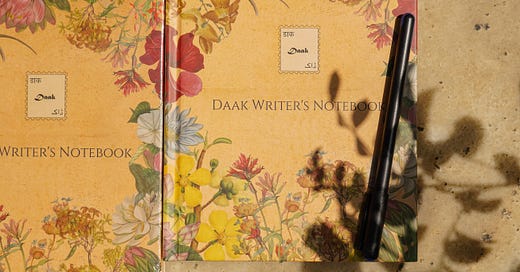Buying Happiness: The Bhutanese Folktale, Meme Haylay Haylay and his Turquoise
This week in Daak:
1. Buying Happiness: The Bhutanese Folktale, Meme Haylay Haylay and his Turquoise
2. Let the Greatest Writers Guide Your Writing
3. Daak Recommends
1. Buying Happiness: The Bhutanese Folktale, Meme Haylay Haylay and his Turquoise
Can success be reduced to a tedious calculation based on spending, consumption, and investment? Bhutan certainly does not think so! The only country to have developed a Gross National Happiness (GNH) index, Bhutan is one of the few countries in the world (certainly the only one in south Asia) that actively prioritizes well-being and quality of life over economic growth, both in its policies and social organisation. If you’ve been fortunate enough to visit, you probably noticed its unhurried pace of life and general air of cheery contentment.
The country’s emphasis on spiritual and emotional fulfilment is deeply rooted in the teachings and cultural traditions of Buddhism. This philosophy is richly illustrated by the folktale of Meme Haylay Haylay, a story about a man who relinquishes his valuable material possession for that universal expression of unbounded joy: a song. This barter — arguably foolish and impractical when seen from a modern, consumerist lens — reveals our deep craving for creativity, joy and beauty, all pointing to the importance of experience over possession.
Read the full story below as you think about your own “turquoise” and “song.”
Meme Haylay Haylay and his Turquoise
Once upon a time there lived a poor old man called Meme Haylay Haylay. One day he went to dig a meadow. As he uprooted a stand of Artemisia plants with a great effort, he found a big, round, shining turquoise. The turquoise was so heavy that a man of his age could hardly lift it with one hand. He stopped digging and went home, carrying the heavy stone in his cane basket.
On the way he met a man leading a horse with a rope.
“Where are you going, Meme Haylay Haylay?” the horse-man asked.
“Don’t say Meme Haylay Haylay any more,” the old man replied. “Meme’s fortune is burning today. As I was digging a meadow, I found this turquoise.”
Before the horseman saw the jewel or uttered a word, Meme Haylay Haylay threw a proposal, “Will you exchange your horse with the stone?”
The horseman stood speechless, for who in the world would barter a turquoise for a horse.
“Don’t joke, Meme Haylay! Your turquoise is priceless, whereas my horse is worthless,” the horseman replied.
“Priceless or worthless, you talk too much. Let there be less talk. If you are for the trade, take this stone and hand over the rope,” Meme Haylay Haylay said.
The horseman lost no time in throwing the rope and went his way carrying the stone, feeling happy. Meme Haylay Haylay went his way, feeling happier than the horseman.
That was not the end of Meme Haylay Haylay’s business.
On the way, he met a man with an ox and exchanged his horse with the ox. He then bartered his ox for a sheep, the sheep for a goat, and the goat for a rooster.
He last met a man singing a melodious song. Tears of happiness swelled Meme Halay’s eyes as he listened to the song. “I feel so happy by merely hearing the song. How happier I would feel if only I knew how to sing myself,” he thought.
“Where are you going, Meme Haylay Haylay?” the songman asked him.
“Today, don’t say Meme Haylay Haylay,” the old man replied.
“Meme’s fortune is now burning. As I was digging a meadow, I found a turquoise. I exchanged it for a horse, the horse for an ox, the ox for a sheep, the sheep for a goat, and the goat for this rooster. Take this rooster and teach me how to sing. I like your melody so much.”
After learning the song, Meme Haylay Haylay parted with his rooster and went home singing the song, feeling the happiest, richest and most successful businessman in the world.
Story by Dorji Penjore & inputs from Fiza Mishra
2. Let the Greatest Writers Guide Your Writing
Looking for inspiration? Get this writer’s notebook which is interspersed with poetry and quotes on writing by the greatest South Asian writers:
3. Daak Recommends
Want to read more Bhutanese folktales? Have a look at this book, Folktales of Bhutan.
Read another Daak on a Kannada folktale, Revenge of an Untold Story.



